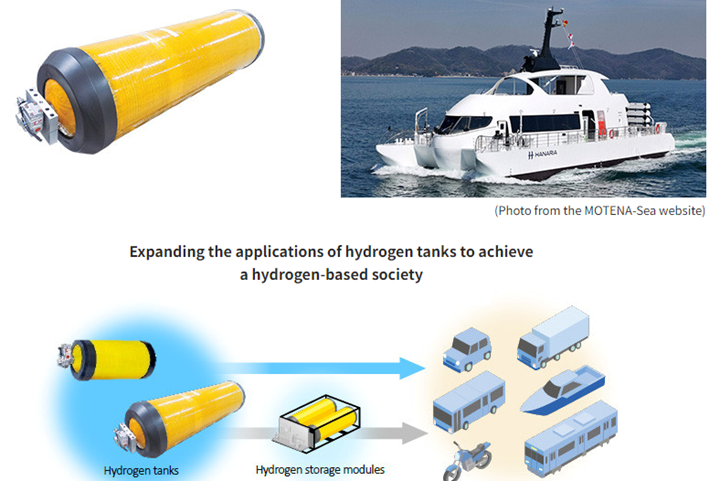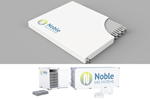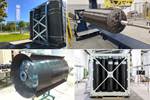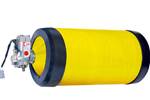Toyoda Gosei composite hydrogen tanks to be used on passenger ship
Multiple commercial truck-type high-pressure tanks have been extended to maritime applications.

Source | Toyoda Gosei
In March 2023, (Kiyosu, Japan) launched a large composite high-pressure hydrogen tank to be used in the mass-produced light-duty fuel cell electric trucks to be produced in Japan (read “...H2 tank for commercial vehicles”). Now, the company has announced that these same tanks are being used on a passenger ship, the Hanaria, equipped with both hydrogen fuel cells and biodiesel-fueled generators.
These large hydrogen tanks employ the hydrogen storage technology developed by Toyoda Gosei and Toyota Motor Corp. for the Mirai fuel cell vehicle — carbon fiber- and glass fiber-reinforced polymer (CFRP and GFRP) tanks — which have been previously only been used on trucks and other commercial vehicles. This latest use on a vessel operated by Motena-Sea (Tokyo, Japan), a company in which Mitsui OSK Lines and others have invested, is in a form of hydrogen storage modules made by Toyota Motor that combine multiple large tanks so that larger amounts of hydrogen can be stored and transported efficiently and conveniently.
Through the provision of tanks and modules suited to the onboard hydrogen needs of all types of mobility, Toyoda Gosei says it will continue contributing to the wider use of hydrogen.
Related Content
-
Honda begins production of 2025 CR-V e:FCEV with Type 4 hydrogen tanks in U.S.
Model includes new technologies produced at Performance Manufacturing Center (PMC) in Marysville, Ohio, which is part of Honda hydrogen business strategy that includes Class 8 trucks.
-
Forvia moves toward more sustainable automotive composites manufacturing
Automotive technology supplier Forvia shares sustainability goals and recent developments aimed at bio-based and recycled materials and ramping up hydrogen tank production for clean mobility.
-
Braided thermoplastic composite H2 tanks with co-consolidated molded boss areas to fit EV battery space
BRYSON project demonstrates possible designs, automated manufacturing and low permeability concepts, including EVOH liner and novel PPA matrix.



